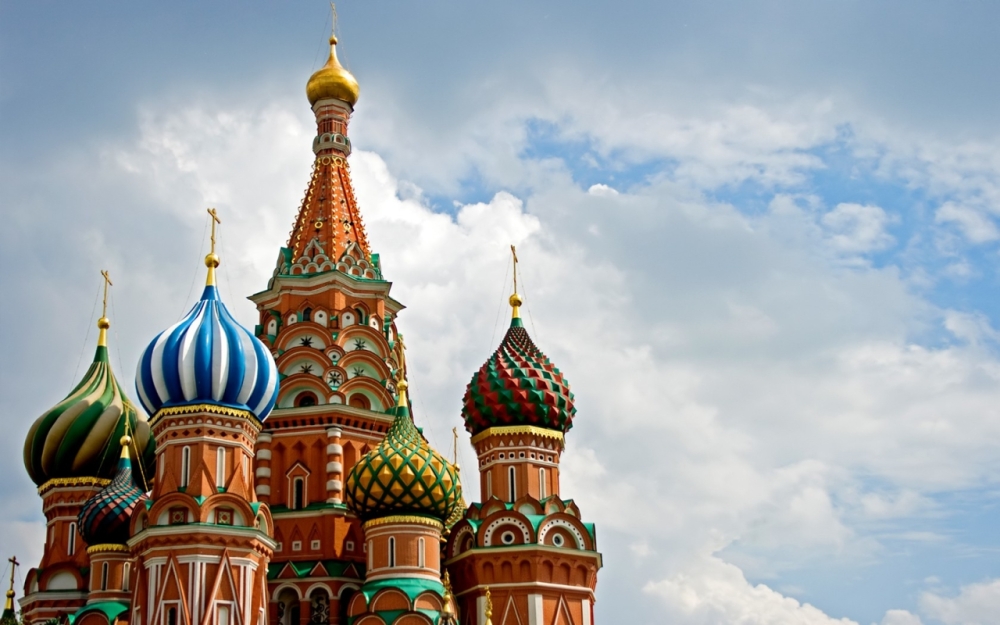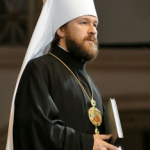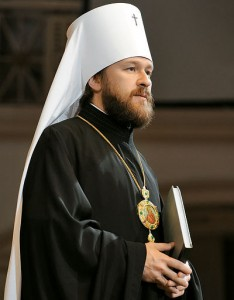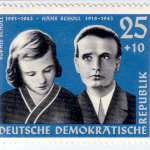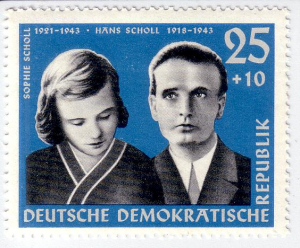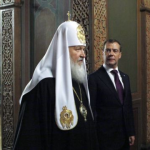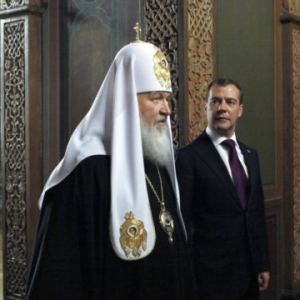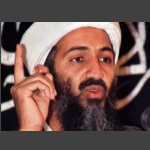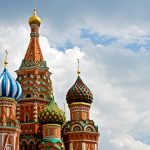
Deprecated: trim(): Passing null to parameter #1 ($string) of type string is deprecated in /home/aoiusa/public_html/wp-content/plugins/sexybookmarks/public.php on line 388
Deprecated: trim(): Passing null to parameter #1 ($string) of type string is deprecated in /home/aoiusa/public_html/wp-content/plugins/sexybookmarks/public.php on line 394
Deprecated: trim(): Passing null to parameter #1 ($string) of type string is deprecated in /home/aoiusa/public_html/wp-content/plugins/sexybookmarks/public.php on line 400
by Fr. Alexander F. C. Webster, James George Jatras, and Fr. Victor Potapov
I. Introduction
As longtime friendly colleagues in the pursuit of a faithful Christian public moral witness in America, we are profoundly saddened and shocked at your unfounded, insulting accusations against the moral integrity of the senior leaders of the Russian Orthodox Church since the Ukrainian crisis erupted in February 2014.
The initial broadside appeared in your column in the Denver Catholic Register on March 18, 2014, when you dismissed Patriarch Kirill of Moscow as “duplicitous” and Metropolitan Hilarion (Alfayev), chairman of the Department of External Church Relations of the Moscow Patriarchate, as “mendacious.” We take increased umbrage at the steady escalation of your Szechuan ad hominem prose since then:
- “These [Ukrainian Greek Catholic] bishops, like other western Christians, have not been duped by the extraordinary campaign of lies that has issued from the Kremlin these past seven months, but…all of us who cherish the spiritual patrimony of Russian Orthodoxy…are deeply saddened when you and Metropolitan Hilarion, your chief ecumenical officer, amplify the falsehoods of President Putin and Foreign Minister Lavrov.” [June 17, 2014]
- “Russian Orthodoxy’s leadership today functions as a Kremlin mouthpiece in matters Ukrainian, even as it lies about the Ukrainian Greek Catholic Church’s role in the current crisis and betrays its ecumenical commitments in doing so…[February 17, 2015]
- “Serious ecumenical theological dialogue is impossible with men who are acting in the world as agents of Russian state power. Pretending otherwise emboldens the Russian Orthodox leadership.” [August 4, 2015]
The condescending, hubristic tone of those comments is surpassed in offensiveness only by your resort to uncharitable epithets—liars, mouthpieces, and dupes—which hardly constitute a reasoned argument. It is well-nigh impossible in this “open letter” to defend Patriarch Kirill and Metropolitan Hilarion from your omniscient pretense to know their hearts and minds. However, we shall attempt here to set the record straight by accurately citing and explaining their public positions on the Ukrainian crisis.
II. Symphonia—Not “Separation”—of Church & State
Far from a throwback to Soviet-era practices—as you have suggested, both in your own words and though uncritical quotation of the Ukrainian Greek Catholic Church’s (UGCC) Major-Archbishop Sviatoslav Shevchuk (“Ukraine Rising,” National Review, Nov. 10, 2014), the close cooperation between Church and state in Russia today is more reminiscent of the pre-1917 symphonia, the Orthodox standard throughout our history since the time of Byzantine Emperor Theodosios I in the late fourth century. That organic instead of adversarial understanding of the sacerdotium and the imperium united, harmoniously albeit with some tension, in a single Christian commonwealth is obviously antithetical to the neo-Jeffersonian principle of strict “separation” of church and state, now political dogma in virtually all Western countries imbued with the notion of secular liberal democracy.
In the restored symbiosis in post-Soviet Russia it is hardly clear that the Church is the junior partner dutifully “amplifying” state policy. To the contrary, as Professor Nicolai N. Petro of the University of Rhode Island pointed out (“Russia’s Orthodox Soft Power,” Carnegie Council for Ethics in International Affairs, March 23, 2015), Kremlin policies “are popular precisely because they have the blessing of the Russian Orthodox Church.” Grounded in a religio-cultural vision of Russky mir—the “Russian World” descended from ancient Kievan Rus’ and embracing the people in Russia, Ukraine, Belarus, and perhaps Kazakhstan—the balance in the contemporary Russian neo-symphonia, as it were, depends on the respective priorities of Patriarch Kirill and the Putin government. As Petro astutely observed, Russky mir is, for the state, “a political or a cultural concept” by which the Russian Orthodox Church “can be a useful tool” for Russia’s domestic and international advancement. But Russky mir is, for the Church, “a religious concept” by which the national governments can be “tools” for the “second Christianization” of the historic lands of Kievan Rus.’
We would argue that, since AD 2000, the Russian neo-symphonia has begun to tip in favor of the Church, not the state, and praise God the Holy Trinity for that! The comprehensive document titled, Bases of the Social Concept of the Russian Orthodox Church, produced by the Department for External Church Relations of the Moscow Patriarchate under the leadership of Metropolitan Hilarion (Alfayev)—whose moral character you have besmirched—is the gold standard of contemporary, yet very traditional, Orthodox social ethics. Other ecclesial initiatives have provided the main impetus for recent Russian laws—decried, alas, by Western liberals—to curb propagandizing and proselytizing of young Russians by “gay rights” advocates, reduce the enormity of abortions in post-Soviet Russia, and protect the sanctity of religious temples from unwanted intrusions by miscreant groups like “Pussy Riot.” In addition, the Russian Church has established a profound inter-confessional collaboration with U.S. evangelicals to promote strong families and traditional marriage between one man and one woman alone.
None of those accomplishments was possible throughout most of the twentieth century. As each of the co-authors of this open letter have acknowledged often in print, Russian Orthodoxy had to endure the godless Soviets for 74 years, including the shameless betrayal of faithful confessors and martyrs by Orthodox hierarchical collaborators with that regime. For you to compare that horrific era to the miraculous re-emergence and moral integrity of the Church since 1991 is shameless.
Whatever criticisms one might have of the symphonia model, blanket condemnation is hardly appropriate as we witness the trend in our own country, where Christianity is increasingly marginalized, moral vices are officially promoted as virtues, and abortion “rights” and homosexual “rights,” in particular, are now key components of U.S. foreign policy—a trend we are sure you deplore no less than we.
III. The Russian Church—a Rival, Not an “Enemy”
Patriarch Kirill, Metropolitan Hilarion, and other prelates of the Russian Orthodox Church have been consistent on two points with respect to Ukraine. First, they voice support for Russia’s policies. Second, they call for restraint in what they see as a deplorable, fratricidal conflict, which pits the Russky Mir against itself.
You need not accept their point of view. Perhaps based on your own religious heritage, you may prefer to believe that the UGCC is “a safe-deposit box of Ukrainian national culture and identity,” despite the mere 15%, at most, of Ukraine’s population who identify as Catholics (Latin or Eastern rite). Underlying the current conflict are some sharp as yet unanswered questions: What exactly is Ukraine (“Borderland”) and who are Ukrainians? Are they an aspiring part of (an increasingly godless and libertine) “Europe” defined in Brussels or an integral part of the Russky Mir? Who was on the “right” or “wrong” side of World War II? Ukrainians themselves are at odds on these questions, largely along regional and confessional lines.
When Ukraine became an independent republic in 1991, those questions lay dormant under a deceptively calm surface. But they remained a fatal weakness in the very fiber of the new state, along with an unbelievable level of oligarchic corruption. The unconstitutional unseating of the flawed but democratically elected government in February 2014 shattered what was already a fragile unity. That, not some mythical Russian aggression, has torn Ukraine apart.
Worse, the overturn of the legal government would not have succeeded without violence or the participation of extreme nationalist elements. You write that Ukraine “rose up against post-Communist corruption and stagnation,” and that Archbishop Shevchuk’s “Church played a central role in the Maidan Revolution of Dignity,’ its bishops and priests dodging Russian bullets to tend to those demonstrating nonviolently for freedom and justice.” However:
- Surely you are aware of the leaked phone call between the EU’s Catherine Ashton and Estonia’s Foreign Minister Urmas Paet, indicating the true source of sniping on the Maidan.
- Surely you know that “those demonstrating nonviolently” included members of violent radical groups like Right Sector, using spiked clubs, Molotov cocktails, and even guns against riot police to seize government buildings—behavior that, in Washington, would be put down immediately with deadly force.
- Surely you know of the May 2014 massacre in Odessa of dozens of anti-Euromaidan demonstrators—or maybe that was just more nonviolent struggle for “freedom and justice”?
- Surely you know of the new law criminalizing criticism of the wartime Organization of Ukrainian Nationalists (OUN) and the Ukrainian Insurgent Army (UPA), sinister fascists guilty of participation in massacres of Jews and of slaughtering tens of thousands of Roman Catholic Poles in Volhynia and Eastern Galicia. Perhaps that’s an example of the “Revolution of Dignity”?
- Surely you know that only two days after the President Viktor Yanukovich fled from Kiev in February 2014 the Ukraine parliament repealed by an 86% majority a 2012 law ensuring, among other things, the official use of Russian as a second language in the predominantly Russian-speaking Donbass region in Eastern Ukraine, where the civil war has since proved most violent. Was that punitive, provocative measure indicative of Ukrainian “freedom and justice”?
- Surely you know that the Ukrainian military’s Azov Brigade engaged in combat in the Donbass region includes self-proclaimed neo-Nazis, perhaps as much as 20% of the unit (according to USA Today, March 10, 2015), complete with swastikas, as well as the infamous “SS” runes and an inverted version of the Wolfsangel symbol used widely during World War II by Nazi German Waffen-SS divisions. Are German broadcaster ZDF and Norwegian broadcaster TV2, which filmed the latter, and NBC News (who reported the incidents online on September 9, 2014), also “dupes” and “mouthpieces” of the Kremlin?
Your trumpeting of a single Ukrainian national will may fit in well with a “good vs. evil” Manichaean narrative to depict the Ukraine conflict as one of West vs. East, democracy vs. tyranny, Ukraine vs. Russia, and, by implication, Catholic vs. Orthodox. It may be great fare for readers of the Denver Catholic Register, National Review, and other publications who may be unaware of past and present complexities. But it is not conducive to a peaceful and just resolution of the Ukraine crisis or averting an even broader conflict that would imperil Europe and the world, including the U.S. Nor is it an excuse to hurl verbal Molotov cocktails at honorable Christian pastors who happen to disagree with you.

*George Weigel is a distinguished lay Roman Catholic theologian and author of the magisterial Witness to Hope: The Biography of John Paul II (Harper Perennial: 2004 [updated edition].

Archpriest Alexander F. C. Webster, PhD, is a retired U.S. Army Chaplain (Colonel), author of four books on Orthodox social ethics, and rector of St. Herman of Alaska Russian Orthodox Church in Stafford, Virginia. James George Jatras, Esq., is Deputy Director of the American Institute in Ukraine, former foreign policy adviser to the U.S. Senate Republican leadership, and a Greek Orthodox layman. Mitred Archpriest Victor Potapov is the dean of St. John the Baptist Russian Orthodox Cathedral in Washington, DC, and a retired Russian language broadcaster for the Voice of America.
